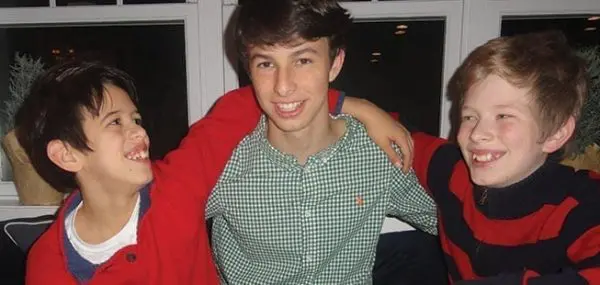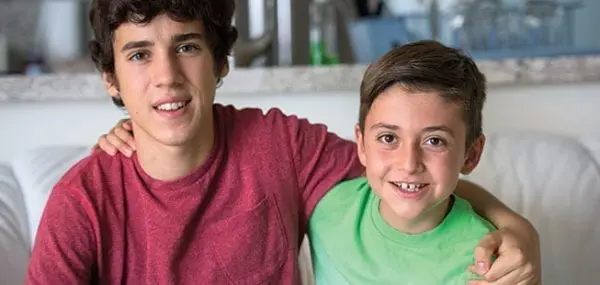The holidays are here, which means your children will be spending a lot of time together. Cue the squabbling and the sibling rivalry, right? Well, maybe not.
Dealing With Teen Sibling Rivalry
Your Teen recently asked Dr. Michael Bradley—author of When Things Get Crazy With Your Teen: The Why, the How, and What to Do NOW—for his go-to recommendations on how to handle sibling rivalry.
Q: Why does sibling rivalry exist?
Bradley: It is part of nature’s plan. Parents view it as a pathology when, in fact, it’s a normal developmental process that helps kids learn a heck of a lot. It’s actually a valuable thing for kids to go through, in the proper dose and tone. But parents hate it; it tears their hearts to see the two creatures they love go after each other.
Q: What are the kids learning?
Bradley: They’re testing. Kids are figuring out how to resolve conflict. They’re figuring out sharing, boundaries, and loyalty. Sibling rivalry is a complex process that helps kids deal with rivalry and competition in the outside world.
Q: What about sibling rivalry in teens? Is it different in adolescence?
Bradley: Little kids will say, “You’re a poopy head,” or “You’re stupid,” or something like that, and parents will kind of chuckle. But when they hit the teen years and start dropping the F-bomb or saying other terrible things, the parents go on red alert, thinking their kids hate each other. In reality, though, they are just trying to figure out how to live together. It simply sounds much worse in adolescence. It’s the same with the parents. Unlike four-year-old language, a teen’s words can really hurt you. It can sound and feel like an adult viciously coming at you.
Q: Is sibling rivalry different for boys and girls?
Bradley: Yes. Girls are 12-18 months ahead of boys in adolescent development, and they’re better at moving people around socially and emotionally. Boys don’t care as much. They may have a big explosion and stomp off and be over it in 20 minutes. Girls can string out conflict for days.
Q: So, what should parents do to solve sibling rivalry?
Bradley: As little as humanly possible. It’s tremendously hard, but again this is normal, natural, and important for kids to go through. The more parents step in, the worse it gets. Parents can do more damage when they try to decide guilt without knowing all of the information. Say, you hear an explosion. You weren’t there. You don’t know who did what to whom. And even if you were there for the explosion, you’re still only seeing the end product. Maybe today’s “victim” was actually yesterday’s villain. You don’t know, and that’s why you’ve got to shrug your shoulders and say, “Sorry I wasn’t there. You have to work it out.”
Q: And then walk away?
Bradley: If you intervene, it’s important to go about it in an unbiased way. You can say to your teenager, “Wow, it seems you’re really angry at your younger sister or brother. Can you tell me about that?” Then, don’t judge. Nod and listen as you would with a friend and say, “Oh, I get it.” You are showing support but not taking sides. Parents may feel like this is not doing anything, but you’re supporting them. If you launch into the, “How dare you treat your younger sister like that,” you are just priming the older child to go after the younger one.
Q: Is there anything else we can do to help?
Bradley: Try to see what else may be going on. If one child is suddenly acting out and you aren’t aware of any specific causes, look at the bigger picture. Maybe their brother or sister is athletic and doing well in sports and the other isn’t. A solution might be to find ways for that child to have stories and status, too. Some children are more needy, while others are more autonomous. If you have a needier child, give them more attention. Show up at school and ambush the kid with a lunch date. They love that. Working in the background like this can help the rivalry.
One trick that works about half the time is to offer an incentive to the competing sibs to work things out on their own. Offer to pay them for each AM and PM that they get through without a major blowout. Be clear that this is a team challenge, that they will win or lose together, even though only one team member may have “started the fight.” This puts the onus upon them to learn to coexist without the parent officiating.
Q: Is it wrong to assume the older child has an unfair advantage?
Bradley: Again, it’s a nuanced judgment. The rule of thumb is don’t intervene in a judgmental way because you don’t know what happens when you aren’t there. And, if you defend the younger child against the older child, you’re giving the older child more reasons to resent the younger one. So, avoid taking sides. In most situations, the younger child takes her shots in other ways.
Q: Can you give parents some hope? When does the rivalry go away or at least start to subside?
Bradley: The less parents mess with it, the earlier it will go away. Otherwise, it can last well into young adulthood, and you don’t want that. In general, the greater the age range between your children, the faster it evaporates. Also, around 16 or 17, a magical truce seems to happen. By this age, your teenager’s brain has matured, and she can think at a higher level. At the same time, her life is expanding with her own friends and activities. Suddenly, the fighting stops and parents are wondering, “What happened?” It’s like everything else in child raising. When you are in the middle of the storm, it just feels awful and hopeless and forever. But, wait out the storm. It’s just a chapter.




